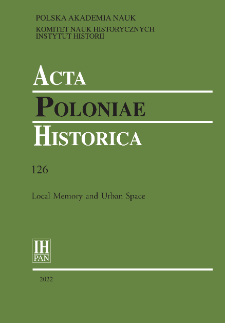- Search in all Repository
- Literature and maps
- Archeology
- Mills database
- Natural sciences
Advanced search
Advanced search
Advanced search
Advanced search
Advanced search

Object
Title: Inconveniences of Memory : The Monument to the Soviet Army and Georgi Dimitrov’s Mausoleum in Sofia after 1989
Subtitle:
Acta Poloniae Historica T. 126 (2022), Local Memory and Urban Space
Institutional creator:
Polska Akademia Nauk. Komitet Nauk Historycznych
;
Polska Akademia Nauk. Instytut Historii im. Tadeusza Manteuffla
![]()
Contributor:
Institute of History of the Polish Academy of Sciences
Publisher:
Instytut Historii Polskiej Akademii Nauk
Place of publishing:
Description:
Abstract:
The paper discusses the transformations of memory caused by the preservation, removal or redefinition of memorials. These transformations indicate the competition between political and ideological views in Bulgarian society after 1989. Two cases are analysed: the deconstruction of Georgi Dimitrov’s already-empty mausoleum in 1999 and the Monument to the Soviet Army, still standing in Sofia. Both instances are significant indicators of power constellations, which, in the second case, also have a precise foreign policy dimension (relations with Russia). The periodically activated debates, especially concerning the Monument to the Soviet Army, indicate the absence of a coherent memory policy and general ambiguous attitudes in Bulgarian society towards the communist past.
References:
Beyen Marnix, ‘Introduction: Local, National, Transnational Memories: A Triangular Relationship’, in Marnix Beyen and Brecht Deseur (eds), Local Memories in a Nationalising and Globalising World (Basingstoke, 2015), 1–23
Decheva Daniela, ‘Der Schatten des Eisernen Vorhangs: Europäische Erinnerungspolitik 30 Jahre nach der friedlichen Revolution’, Südosteuropa Mitteilungen, 5 (2020), 55–66
Dobre Claudia-Florentina, ‘Uses and Misuses of Memory. Dealing with the Communist Past in Postcommunist Bulgaria and Romania’, in Małgorzata Pakier and Joanna Wawrzyniak (eds), Memory and Change in Europe. Eastern Perspectives (New York, 2016), 299–316
Meyer Erik, ‘Memory and Politics’, in Astrid Erll and Ansgar Nünning (eds), Cultural Memory Studies. An International and Interdisciplinary Handbook (Berlin–New York, 2008), 173–80
Müller Jan-Werner, ‘Introduction: The Power of Memory, the Memory of Power and the Power over Memory’, in Jan-Werner Müller (ed.), Memory and Power in Post-War Europe: Studies in the Presence of the Past (Cambridge, 2004), 1–35
Snyder Timothy, ‘Memory of sovereignty and sovereignty over memory: Poland, Lithuania and Ukraine, 1939–1999’, in Jan-Werner Müller (ed.), Memory and Power in Post-War Europe (Cambridge, 2004), 39–58
Vukov Nikolai, ‘Refigured Memories, Unchained Representations. Post-Socialist Monumental Discourse in Bulgaria’, in Ulf Brunnbauer und Stefan Tröbst (eds), Zwischen Amnesie und Nostalgie. Die Erinnerung an den Kommunismus in Südosteuropa (Köln, 2007), 71–86
Велева-Ефтимова Мирела, ‘Завръщането на България в Европа – под сянката на русофилската традиция’ [The return of Bulgaria to Europe – Under the Shadow of the Russophile Tradition], Социологически проблеми, xlix, 1–2 (2017), 186–208
Станоева Елица, ‘В крак с времето: два паметника на социализма в собственото им време’ [Keeping up with the Times: Two Monuments to Socialism in Their Own Time], in Милена Якимова, Петя Кабакчиева, Марина Лякова, and Вероника Димитрова (eds), По стъпките на Другия: сборник в чест на Майя Грекова (София, 2014), 240–52
Relation:
Volume:
Start page:
End page:
Detailed Resource Type:
Format:
Resource Identifier:
oai:rcin.org.pl:237673 ; 0001-6829 ; 2450-8462 ; 10.12775/APH.2022.126.05
Source:
IH PAN, sygn. A.295/126 Podr. ; IH PAN, sygn. A.296/126 ; click here to follow the link
Language:
Rights:
Creative Commons Attribution BY-ND 4.0 license
Terms of use:
Copyright-protected material. [CC BY-ND 4.0] May be used within the scope specified in Creative Commons Attribution BY-ND 4.0 license, full text available at: ; -
Digitizing institution:
Institute of History of the Polish Academy of Sciences
Original in:
Library of the Institute of History PAS
Projects co-financed by:
Access:
Object collections:
- Digital Repository of Scientific Institutes > Partners' collections > Institute of History PAS > Serials
- Digital Repository of Scientific Institutes > Partners' collections > Institute of History PAS > Institute Publications
- Digital Repository of Scientific Institutes > Partners' collections > Institute of History PAS > Institute Publications > Journals
- Digital Repository of Scientific Institutes > Partners' collections > Institute of History PAS > Institute Publications > Journals > Acta Poloniae Historica
- Digital Repository of Scientific Institutes > Literature > Journals/Articles
Last modified:
Sep 22, 2023
In our library since:
Feb 7, 2023
Number of object content downloads / hits:
52
All available object's versions:
https://rcin.org.pl./publication/273924

 INSTYTUT ARCHEOLOGII I ETNOLOGII POLSKIEJ AKADEMII NAUK
INSTYTUT ARCHEOLOGII I ETNOLOGII POLSKIEJ AKADEMII NAUK
 INSTYTUT BADAŃ LITERACKICH POLSKIEJ AKADEMII NAUK
INSTYTUT BADAŃ LITERACKICH POLSKIEJ AKADEMII NAUK
 INSTYTUT BADAWCZY LEŚNICTWA
INSTYTUT BADAWCZY LEŚNICTWA
 INSTYTUT BIOLOGII DOŚWIADCZALNEJ IM. MARCELEGO NENCKIEGO POLSKIEJ AKADEMII NAUK
INSTYTUT BIOLOGII DOŚWIADCZALNEJ IM. MARCELEGO NENCKIEGO POLSKIEJ AKADEMII NAUK
 INSTYTUT BIOLOGII SSAKÓW POLSKIEJ AKADEMII NAUK
INSTYTUT BIOLOGII SSAKÓW POLSKIEJ AKADEMII NAUK
 INSTYTUT CHEMII FIZYCZNEJ PAN
INSTYTUT CHEMII FIZYCZNEJ PAN
 INSTYTUT CHEMII ORGANICZNEJ PAN
INSTYTUT CHEMII ORGANICZNEJ PAN
 INSTYTUT FILOZOFII I SOCJOLOGII PAN
INSTYTUT FILOZOFII I SOCJOLOGII PAN
 INSTYTUT GEOGRAFII I PRZESTRZENNEGO ZAGOSPODAROWANIA PAN
INSTYTUT GEOGRAFII I PRZESTRZENNEGO ZAGOSPODAROWANIA PAN
 INSTYTUT HISTORII im. TADEUSZA MANTEUFFLA POLSKIEJ AKADEMII NAUK
INSTYTUT HISTORII im. TADEUSZA MANTEUFFLA POLSKIEJ AKADEMII NAUK
 INSTYTUT JĘZYKA POLSKIEGO POLSKIEJ AKADEMII NAUK
INSTYTUT JĘZYKA POLSKIEGO POLSKIEJ AKADEMII NAUK
 INSTYTUT MATEMATYCZNY PAN
INSTYTUT MATEMATYCZNY PAN
 INSTYTUT MEDYCYNY DOŚWIADCZALNEJ I KLINICZNEJ IM.MIROSŁAWA MOSSAKOWSKIEGO POLSKIEJ AKADEMII NAUK
INSTYTUT MEDYCYNY DOŚWIADCZALNEJ I KLINICZNEJ IM.MIROSŁAWA MOSSAKOWSKIEGO POLSKIEJ AKADEMII NAUK
 INSTYTUT PODSTAWOWYCH PROBLEMÓW TECHNIKI PAN
INSTYTUT PODSTAWOWYCH PROBLEMÓW TECHNIKI PAN
 INSTYTUT SLAWISTYKI PAN
INSTYTUT SLAWISTYKI PAN
 SIEĆ BADAWCZA ŁUKASIEWICZ - INSTYTUT TECHNOLOGII MATERIAŁÓW ELEKTRONICZNYCH
SIEĆ BADAWCZA ŁUKASIEWICZ - INSTYTUT TECHNOLOGII MATERIAŁÓW ELEKTRONICZNYCH
 MUZEUM I INSTYTUT ZOOLOGII POLSKIEJ AKADEMII NAUK
MUZEUM I INSTYTUT ZOOLOGII POLSKIEJ AKADEMII NAUK
 INSTYTUT BADAŃ SYSTEMOWYCH PAN
INSTYTUT BADAŃ SYSTEMOWYCH PAN
 INSTYTUT BOTANIKI IM. WŁADYSŁAWA SZAFERA POLSKIEJ AKADEMII NAUK
INSTYTUT BOTANIKI IM. WŁADYSŁAWA SZAFERA POLSKIEJ AKADEMII NAUK


































